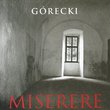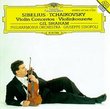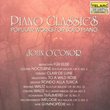| All Artists: Johannes Brahms, Felix [1] Mendelssohn, Lilya Zilberstein, Martha Argerich Title: Brahms: Sonata for 2 Pianos; Mendelssohn: Piano Trio #1; Martha Argerich Members Wishing: 0 Total Copies: 0 Label: EMI Classics Release Date: 6/10/2003 Album Type: Live Genre: Classical Styles: Chamber Music, Forms & Genres, Sonatas, Historical Periods, Classical (c.1770-1830), Romantic (c.1820-1910) Number of Discs: 1 SwapaCD Credits: 1 UPC: 724355750426 |
Search - Johannes Brahms, Felix [1] Mendelssohn, Lilya Zilberstein :: Brahms: Sonata for 2 Pianos; Mendelssohn: Piano Trio #1; Martha Argerich
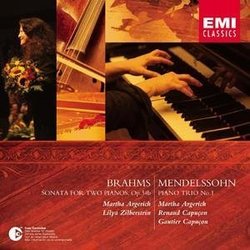 | Johannes Brahms, Felix [1] Mendelssohn, Lilya Zilberstein Brahms: Sonata for 2 Pianos; Mendelssohn: Piano Trio #1; Martha Argerich Genre: Classical
|
Larger Image |
CD DetailsSimilar CDs
Similarly Requested CDs
|
CD ReviewsVARIABLE STAR DAVID BRYSON | Glossop Derbyshire England | 12/24/2003 (5 out of 5 stars) "There are 5-star ratings and 5-star ratings. My conscience is quiet in awarding one to this disc provided I make it as clear as I can to music-lovers unacquainted with Argerich's work what they should and should not expect. In this age of spectacular virtuosi and virtuose, what makes one say `Argerich' on hearing an unfamiliar performance is a very characteristic impetuosity. When Argerich is at her most unmistakable she will abruptly move the tempo up a gear or more than one during fast movements, and if she is playing a concerted piece at the time so will whoever else is involved however distinguished. (Just hear Rostropovich follow her in the last movement of Chopin's cello sonata.) This disc is absolutely fascinating in giving us one performance (the Brahms) that shows that side of her, and another that sheds a completely different light on this great, temperamental and intriguing artist. And of course she is not on her own in either of these pieces, and thereby hangs a tale too.My `chiefest and most principal' reason for acquiring this record was to own the Brahms in its 2-piano version, described by Tovey as `magnificent as to clarity and power' or words to that effect. In our everyday musical lives it is the piano quintet, and although I am one of Brahms's more immoderate admirers, that is a piece where I can keep my composure better than in many others. Fine performances of it are rarer than blackberries in September, but still the rule rather than the exception, and there has been for three-quarters of a century a guiding star for its interpretation - a binary consisting of Serkin's two accounts, first with the Busches and decades later his very-little-different version with the Budapest. This is not in the Serkin mould at all, as is obvious after a few bars when Argerich typically flies at the semiquaver outburst. The first movement is arguably too fast, but unarguably thrilling. Ensemble with Zilberstein is a little ragged here and there, but that just adds to the excitement, and the clarity that Tovey found in this arrangement kept me fascinated by canonic devices that I had noticed much less in the quintet version. The second movement is categorically too fast - Brahms asks for a touch of adagio in the tempo, and the movement should basically be a lullaby. The third movement is superb, and for some reason I became more aware than usual of how the outer sections are modelled, bar for bar and modulation for modulation, on the first section of the third movement of Beethoven's fifth symphony. In the introduction to the finale the players make no attempt to recapture the whispered mystery that strings can invest it with, and I suspect rightly not. And in the final allegro ma non troppo the tempo is dead right - going too fast here would have been an outrage. They even apply a stately allargando to the last phrase of all, and I found I liked that. In passing, the liner note says that the lost strings-only original was a quartet version, not as I had always thought a quintet with 2 cellos like Schubert's. As the note is the work of one of the most unpleasing wafflers in the business, I shall provisionally disbelieve this statement.In the Mendelssohn trio we are in a different world. Here Argerich is joined by the youthful brothers Capucon, and there is much more feeling of equality among the players. Argerich relaxes, even in the marvellous fleetness of the scherzo. She is perennially youthful herself, and I hope to hear more of her collaborators here who are clearly major interpreters in their own right. It is a young people's reading throughout, far more so than most versions I hear, but reminiscent of what I heard from the prodigiously gifted students of the Royal Northern College of Music in Manchester at their recent Mendelssohn chamber-music festival.I first heard Argerich at the Edinburgh Festival 40 or so years ago. It seemed to me then that I was listening to a new Horowitz, and I had not at that time grasped the significance of Michelangeli, whose pupil she was albeit only for four lessons. Michelangeli claimed to have taught her `the music of silence', a remark apparently as incomprehensible to her as to me. As far as the music of sound goes, she is unique, like all the greatest players. I gather she plans no more solo events, and I hope there will be more chamber work as involving as I have found this disc." Martha shines at lugano DAVID BRYSON | 06/21/2003 (5 out of 5 stars) "On this CD are two recordings from the 2002 Summer Music Festival in Lugano Switzerland featuring chamber music collaborations with Martha Argerich. Although the three other musicians debuting at Lugano ,including the Capucon brothers, were integral parts of the performances, the recordings undoubtedly focus on Martha Argerich's transcendental pianism.The first work, the Brahms Piano Quintet in it's original form as a two piano sonata is a stunning work. Being a die-hard Argerich fan and pianist myself, I have to say that her recordings of this piece reign supreme. I would say, however, that this is not Martha Argerich's best recording of this piece...in many places, her collaborator Lilya Zilberstein becomes rather sloppy and it becomes difficult for them to continue together. It also lacks the subtulty of her greatest recording, with Rabinovich--technically superior as well, which I would reccomend everyone buy.The Mendelssohn Trio is taken slightly too far out of context in it's interpretation...it becomes almost Debussy--as Argerich often plays music of this period. Brilliant last movement, introspective second, blisteringly fast third (of course), and a rather strange but beautiful first. The Capucon brothers make a stunning debut at the festival and one should keep one's eyes on them in the future. I would reccomend more her recording done at the Beppu Festival with Gil Shaham and Mischa Maisky which is bursting with vitality and is played more in context. Sadly however, this recording is only available in Japan ...Miss Argerich personally gave me a copy so I wouldn't know where to buy one.Although the Mendelssohn is slightly out of context and the Brahms rather inprecise at times, this is still a must have CD. However, I would advise those wishing to hear Argerich's recording of the Mendelssohn not to fall into the trap of imitating her phrasing as I did. A MUST HAVE FOR ANY DIE-HARD ARGERICH FAN!!!" Dynamic Alan Lekan | Boulder, CO | 05/20/2005 (5 out of 5 stars) "I must be getting boring as I get older as listening to a live performance such as this one on a Friday night is my idea of a good time. The masterpiece compositions, energetic performances, excellent sound and the "live" dynamism that comes only from a concert performance all come together to create a magical moment in time - especially for fans of Argerich. This is a most satisfying CD.
The duo-piano version (Op. 34b) of Brahms famous piano quintet (Op. 34) was composed before the final piano quintet version. Thankfully, perfectionist Brahms did not throw this one in the trash as was his custom for works he was not satisfied with. The piano duo version here is given a lively and spunky performance that one would expect from Argerich - albeit with some out-of-synch piano playing in some spots. But, for Argerich fans this will likely not cause much distress as when one deeply admires someone or something, imperfections are lovingly overlooked. In the third movement scherzo, Argerich shows why she is one of the most dazzling pianists around with a powerful rhythmic propulsion that her partner struggles to match at times. I actually prefer the duo-piano version (this recording) to the piano quintet recordings I have, probably due to the vivacity and drama Argerich brings to it here. But, the real star of this set may in fact be the Mendelssohn piano trio where Argerich is joined by a hot, newer talent from France - the Capucon brothers. I'll remember their names after hearing this performance. The three are in marvelous synch throughout the entire set and create truly wonderous sonorities and riverting musical moments. The second movement in particular is exceedingly lovely and is brought out by the Capucon brothers' strings with great lushness and passion. Their intonation is wonderous. EMI captures their instruments with great realism and warmth that is melting at times. But, in the last two movements, it is Argerich who jumps in the drivers seat and shifts up a gear or two, with the two Capucon strings right there with her. It is marvelous music, with Martha laying down rapid-fire notes with such delicacy, lightness and precision that should put a smile on your face - part out of amazement, part out of delight. Their treatment of Mendlessohn's famous "gossamer-like" scherzo is spot-on - with an ever-so-light touch, blazing speed, supreme precision of ensemble. The integration of all this takes great concentration and teamwork which is not lacking one bit here. This piece is an absolute gem and, thankfully too, is recorded with a satisfying, dynamic sound to enhance the experience. And, unlike some other Argerich concert recordings where audience coughing is just as loud as the music, this recording is pristine and the only audience noise you will hear is thunderous applause at the end of each of the two works. A most exciting and recommended CD, especially for Argerich fans. (Also highly recommended is the Caupucons' recordings of Brahms piano trios with Nicholas Angelich on Virgin). Compositions - 5 stars; Performance - 5 stars; Sound - 4.5 stars. " |

 Track Listings (8) - Disc #1
Track Listings (8) - Disc #1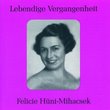
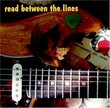


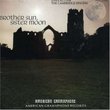

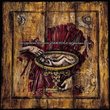


![Across The Universe [Deluxe Edition]](https://nationalbookswap.com/cd//m/51/1251/1241251.jpg)
